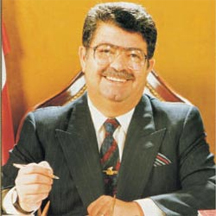ISTANBUL, (Reuters) – An autopsy on late President Turgut Ozal, who led Turkey out of military rule in the 1980s and whose body was exhumed last month, will reveal he was poisoned, his son believes, calling for a full investigation of the “dark years” two decades ago when he died.
Ahmet Ozal was speaking after a newspaper report said high levels of poison had been identified by the autopsy, carried out after his father’s body was dug up on the orders of prosecutors investigating suspicions of foul play in his death.
State forensic authorities have denied the media report.
Ozal’s moves to end a Kurdish insurgency and create a Turkic union with central Asian states have been cited as motives for would-be enemies in the shadowy “deep state”, in which security establishment figures and criminal elements colluded.
Ozal died of heart failure while in office in April 1993 at the age of 65. After undergoing a triple heart bypass operation in the United States in 1987, he kept up a gruelling schedule while remaining overweight until he died.

But his family believe he was the victim of a plot.
“Even though 19 years have passed, thanks to technological advances and rigorous investigation they are capable of finding poisonous substances … I believe they will be found,” former member of parliament Ahmet Ozal told Reuters late on Saturday.
“I am 100 percent sure his death was not normal. If it is indeed proven, then Turkey should thoroughly investigate the dark years,” he said, noting that top investigative journalist Ugur Mumcu was killed in a car bomb the year Ozal died.
It was Turkey’s military leaders who appointed him as a minister after a period of military rule following a 1980 coup.




